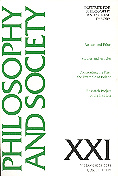VESTERPLATE ILI JEDVABNE: DEBATE O ISTORIJI I „KOLEKTIVNOJ KRIVICI“ U POLJSKOJ
WESTERPLATTE OR JEDWABNE?: DEBATES ON HISTORY AND „COLLECTIVE GUILT“ IN POLAND
Author(s): Wojciech StanisławskiSubject(s): Social Sciences
Published by: Institut za filozofiju i društvenu teoriju
Keywords: collective memory; “collective guilt”; Poland; Institute of National Memory; debate; history; truth
Summary/Abstract: The author analyzes recent Polish debates on researching silenced aspects of national history and the problem of the “collective guilt”. One of the major questions arising in these debates is: does the study of “white spots” from the past (have to) lead to a trauma of continuous collective self-blame? In Poland, a specialized institution, the Institute of National Memory, was founded in 1998, engaging in research, documentation and public education on events related to German and Soviet occupation during WWII and the activity of political police under communism. Polish debates on the past got particularly inflamed after the discovery made by the historian J.T.Gross on the participation of Poles in the massacre of Jewish inhabitants of the town of Jedwabne in 1941. His book published in 2000 provoked a heated debate in which methodological, political and moral arguments were used on both sides. This case also occasioned a polemic between two prominent historians, identifying two basic visions of national history: the “monumental” one, recognizing only the heroic deeds that the nation takes pride in, and the “skeptical” one, which looks for silenced and shameful facts. Though both participants in the polemic opt for the third vision, the “objective” history which dispassionately seeks the truth, one of them stresses the role of the monumental history in maintaining the cohesion of the national community, while the other emphasizes that the collective acknowledgement of the nation’s crimes can be a basis for national pride.
Journal: Filozofija i društvo
- Issue Year: 2002
- Issue No: 21
- Page Range: 259-270
- Page Count: 12
- Language: Serbian

